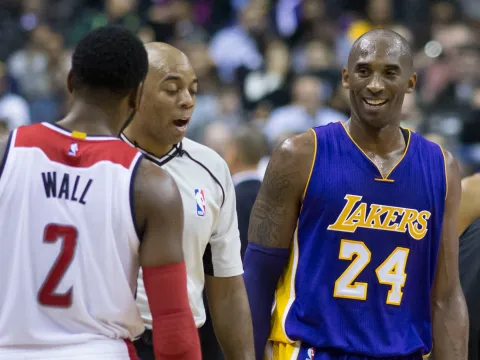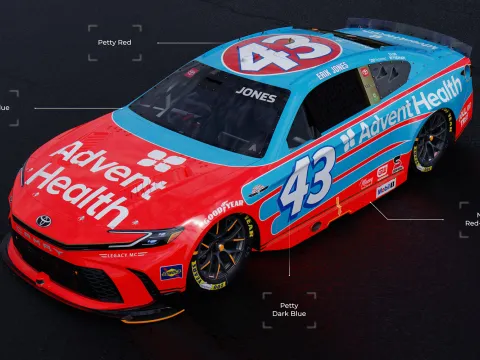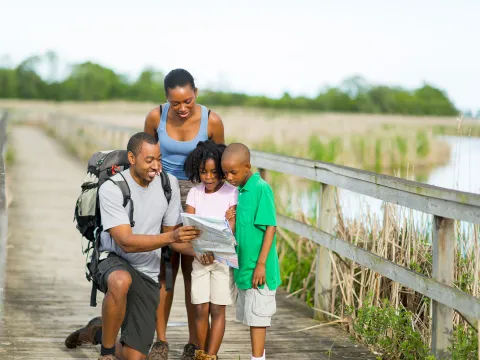- AdventHealth

On the morning of January 26, 2020, the world lost a sports legend. Kobe Bryant and his 13-year-old daughter Gianna were among nine people who died in a helicopter crash in Calabasas, California.
As the details about the accident continue to emerge, millions of people around the world are mourning the basketball legend’s sudden and tragic loss.
Celebrities’ heartfelt tributes echo across social media, detailing the shock, disbelief and anguish of Kobe’s loss. Thousands of Los Angeles residents and Lakers fans of all walks of life continue to gather around makeshift memorials at the Staples Center, laying flowers, lighting candles and holding each other close.
U.S. Senate members remember Bryant in prayers led by the Senate chaplain, and Grammy nominees and winners dedicated the evening to Bryant, “in the house that Kobe built,” at the Staples Center.
To so many people, Kobe was more than an NBA legend. And for the youngest among us, his death is no less of a loss. Kids who looked up to him deserve a helping hand to navigate the grief of losing a role model.
How to Help Kids Cope With the Death of Role Model
It’s equally important and difficult to talk about tragedies with your kids, and the untimely death of someone they look up to can be especially painful. Although it can feel confounding and overwhelming, open the door to communication with your kids.
Let Them Know It’s OK to Talk About Grief
Give your kids the opportunity to talk about how Kobe’s death feels. Even if they don’t want to talk about it at first — it might be days or weeks later — let them know that it’s OK to do so. Your comfort and reassurance can go a long way in helping them cope with the loss of their role model.
It’s Not About Knowing the Right Thing to Say
It’s OK that you don’t have all the answers about Kobe’s death, why it happened or what will happen in the months and years ahead. No one knows, yet. What matters is that you’re there for your kids, willing to listen to and see them through it.
For Very Young Kids, Keep the Explanation Simple
Keep your child’s age in mind when you talk about death. Very young children don’t always need all the details. They just need to know they’re safe.
Focus on the outpouring of love shared by the Kobe fan community, like all the memorials, tributes and ways people are comforting each other. Focusing on the good things people are doing can build resilience and character in children as they’re growing.
Remind your little ones that even in the sad times, good things can happen. For people of faith, God is here, and He is still doing great things and trying to make this better. Even though it’s scary and sad, there are thousands of people out there doing good, spreading love and helping each other through this hard time.
Be Mindful of the Physical Symptoms of Grief
Kids and adults process grief differently. Kids express their emotions and fears in different ways, and young children might not have the language skills to express grief. They may have sleeping issues, eating habits or regressive behaviors that you haven’t seen in awhile, like sucking their thumb. It’s normal for that to happen for a little bit of time, but it’s also OK to reach out to your pediatrician about behavioral concerns.
Let Them Know You Share Their Grief
As a parent, it’s OK for you to be honest about your feelings in the wake of this tragedy. You can verbalize how much Kobe meant to you, too. “This breaks my heart, too,” and “I’ll miss him so much,” are sentiments your kids can empathize with, but the key is to keep these sentiments to a minimum. Make sure you’re able to shift the conversation to listening to your children and addressing their grief.
Ask Questions and Listen to Their Answers
In a time of grief, one of the most effective ways to help your kids is listening to them. Remind them that it’s OK to ask questions, too, and that there are no silly or dumb questions.
Sometimes the questions they have might be completely unrelated to the tragedy. They might be worried about traffic or the sound of helicopters.
To start the conversation, you can also ask open-ended questions, and be prepared to listen to their responses. You can ask questions, like:
- How are you feeling today?
- What are you most worried about?
- What is the one thing that bothers you the most about this?
- What do you want to do to remember your role model?
Be Honest About the Reality of Tragedy, But Reassuring, Too
When tragedies happen, it can be tempting to make promises we can’t keep for the sake of helping our kids cope with an increasingly scary world. In light of Kobe’s helicopter crash, your kids might ask if something similar will ever happen to them.
As much as you want to, you can’t predict that it won’t. However, you can reassure your kids that you’ll always do everything you can to keep them safe. Let them know, too, that there are good people in the world — like firefighters, police officers and paramedics — who will rush to their aid in a crisis like a helicopter crash.
Role Models Live on Through Their Legacy
In the wake of a death, remind your kids that someone doesn’t stop being a role model after they die.
Even though a role model’s time may be cut short, they’re still someone worth looking up to, and someone worth remembering for the lessons they taught and how they inspired others to be their best selves. Their life continues to inspire people, long after they’re gone. That’s what it means to leave a legacy.
Just like Kobe Bryant, all role models leave a legacy for kids to embrace in their own lives. And a role model’s legacy — however your child defines it — can live on in your child’s heart forever.


